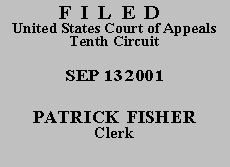

| UNITED STATES OF AMERICA,
Plaintiff-Appellee, v. MICHAEL WILLIAM GARDNER, Defendant-Appellant. |
|
Defendant Michael William Gardner appeals the district court's denial of his motion to dismiss the second count of the indictment because it was premised on an unconstitutional statute. We affirm.
Defendant, a convicted felon, rented a motel room in which police found a handgun, displayed openly and within defendant's control. Defendant was charged with, inter alia, possession of a firearm by a felon in violation of 18 U.S.C. § 922(g)(1). Defendant moved to dismiss this count of the indictment, arguing that the possession statute was beyond Congress' power to enact under the Commerce Clause because mere possession of a firearm does not have a "substantial effect" on interstate commerce, citing United States v. Lopez, 514 U.S. 549 (1995), United States v. Morrison, 529 U.S. 598 (2000), and Jones v. United States, 529 U.S. 848 (2000).
The district court denied defendant's motion, holding that the statute is constitutional because its jurisdictional element requires that the firearm be possessed in and affecting commerce, and that Lopez does not require more than a de minimis effect on interstate commerce in individual cases. Defendant then pled guilty to constructively possessing the weapon "in and affecting interstate commerce" because the firearm had crossed state lines to reach Oklahoma. See Aplt. App. at 102, 119; Aplee. Supp. App. at 163. As part of the plea agreement, defendant agreed to "waive[] his right to appeal or collaterally challenge [his] guilty plea and any other aspect of his conviction, except the court's pretrial disposition of . . . Defendant's Motion to Dismiss Count 2." Aplee. Supp. App. at 166.
In this appeal, defendant raises two constitutional challenges to 18 U.S.C. § 922(g)(1): a facial challenge regarding Congress' power to enact the statute under the Commerce Clause, and an "as applied" challenge based on its application to his constructive possession of the firearm. Defendant concedes that his facial challenge is foreclosed by our decision in United States v. Dorris, 236 F.3d 582 (10th Cir. 2000), cert. denied, 121 S. Ct. 1635 (2001), which, indeed, resolved the exact challenge raised by defendant. See id. at 585-86 (holding that Lopez, Morrison, and Jones did not implicate prior cases upholding § 922(g)(1) as a valid exercise of congressional power under the Commerce Clause, and explaining that the statute is valid because it regulates the possession of goods moved through interstate commerce and because its jurisdictional element limits the statute to firearms that are the subject of interstate trade).
Defendant's challenge to the statute "as applied" is waived by his plea agreement. In United States v. Dwyer, 245 F.3d 1168 (10th Cir. 2001), we held on almost identical facts that the defendant's admission that he constructively possessed a firearm "in and affecting interstate commerce" waived any constitutional challenge as to whether his possession was sufficiently connected to interstate commerce. See id. at 1170. Because here defendant made the same admission and raises the same challenge, Dwyer forecloses his argument.
Defendant attempts to distinguish Dwyer by arguing that in this case the plea agreement preserved for review the district court's resolution of his constitutional challenge to the statute. However, defendant's motion to dismiss only made a facial challenge to the statute, and did not argue that the statute was unconstitutional as applied. See Aplt. App. at 16-32. Because the "as applied" challenge was not raised in his motion to the district court, it is now precluded by his waiver of the right to appeal all other issues in the plea agreement. See United States v. Elliott, No. 00-5010, 2001 WL 991955, at *1-*2 (10th Cir. Aug. 30, 2001) (holding the court will enforce a defendant's knowing and voluntary waiver of the right to appeal his conviction in a plea agreement).
The judgment of the United States District Court for the Western District of Oklahoma is AFFIRMED.
Entered for the Court
Circuit Judge
*. This order and judgment is not binding precedent, except under the doctrines of law of the case, res judicata, and collateral estoppel. The court generally disfavors the citation of orders and judgments; nevertheless, an order and judgment may be cited under the terms and conditions of 10th Cir. R. 36.3.